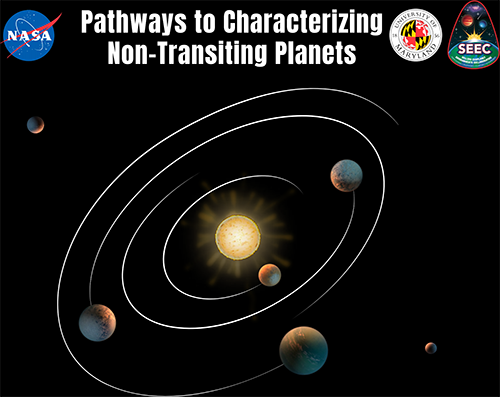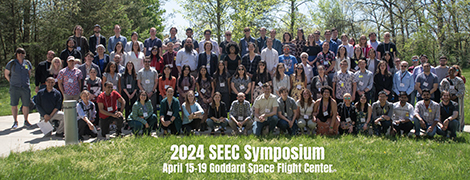April 15 – 19, 2024
NASA Goddard Space Flight Center
Greenbelt Maryland, USA
Click here to register.
Virtual participants: Please fill the following google form. An online participation link will be sent to you closer to the conference date;
Some travel support is available. Please contact the SOC chairs for more information.
Talk Slides should be 16x9 and posters should aim 36"x48" vertical or horizontal.
Hosted by GSFC Sellers' Exoplanet Environments Collaboration and University of Maryland College Park Department of Astronomy
Recent exoplanet surveys from the ground have discovered myriad nearby systems that are non-transiting. Currently, the number of known non-transiting systems dominate by a factor of two compared to transiting ones within 20 pc, and by a factor of 9x within 10 pc. It is expected that the number of detected non-transiting planets will continue to grow in the coming years with more high-precision radial velocity surveys, next-generation direct imaging capabilities, Gaia astrometry, and the launch of flagship space missions like the Roman Space Telescope. This interdisciplinary symposium will focus on exploring pathways to characterize non-transiting planets - in particular, the regions of planetary parameter space that are not well represented in transiting planet characterization studies. The goal will be to engage communities working with ground- and space-based observational methods as well as contextualizing theoretical models to prepare for the characterization of these planets in the next decade.
Focus Topics:
- Observations of Nearby Non-Transiting Planets: Phase Curves, Radial Velocity, Astrometry, Direct Imaging
- Demographics of Non-Transiting Planet Population: Microlensing, Radial Velocity, Astrometry
- Characterization: Planetary Parameters, Atmospheres, and System Architectures Using Space-based
and Ground-based Approaches - Theory and Modeling of Non-Transiting Planets
- Science Priorities, Technology Gaps, Instruments and Missions
Due to space limitations, the symposium attendance will be limited to 160 attendees.
This symposium is a hybrid meeting. Remote participation is available.
List of invited speakers:
- Melodie Kao (UC Santa Cruz)
- Jennifer Burt (JPL)
- Przemek Mroz (University of Warsaw)
- Rachel Fernandes (Penn State)
- Mary Anne Limbach (U. Michigan)
- Brittany Miles (U. Arizona)
- Tyler Robinson (U. Arizona)
- Sarah Millholland (MIT)
- Yuka Fujii (NAO, Japan)
- Eduardo Bendek (NASA Ames)
- Mercedes Lopez-Morales (CFA, Harvard)
A PDF of the schedule is available here.
A PDF of the bus schedule is available here.
To submit your oral presentation, go to https://forms.gle/jCeQb5iDbTX2C2WU6
To submit your flash talk, go to https://forms.gle/QH5235zoQ123nFoSA
SOC Chairs: Ravi Kopparapu (NASA GSFC), Elisa Quintana (NASA GSFC), Tad Komacek (U. Maryland)
SOC: Daniel Angerhausen (ETH Zurich, LIFE), Jessie Christiansen (IPAC), Matthew Penny (LSU), Sukrit Ranjan (Arizona), Leslie Rogers (UChicago), Rob Zellem (NASA-JPL)
LOC Chairs: Prabal Saxena (NASA GSFC), Erika Kohler (NASA GSFC), Allison Youngblood (NASA GSFC), Aaliyah Kerr (GSFC/SURA)
LOC: Caleb Cañas (NASA GSFC), Achref Dhahbi (NASA GSFC), Vincent Kofman (NASA GSFC), Natasha Latouf (NASA GSFC), Dana Louie (NASA GSFC), Noah Tuchow (NASA GSFC), Nicole Wallack (Carnegie Earth & Planets Laboratory), Robert Washington (Howard University)


